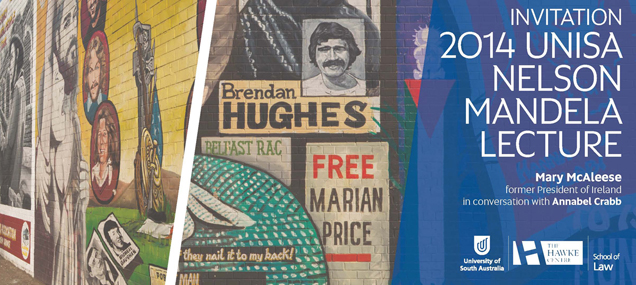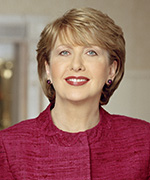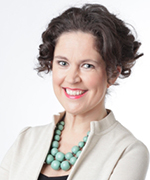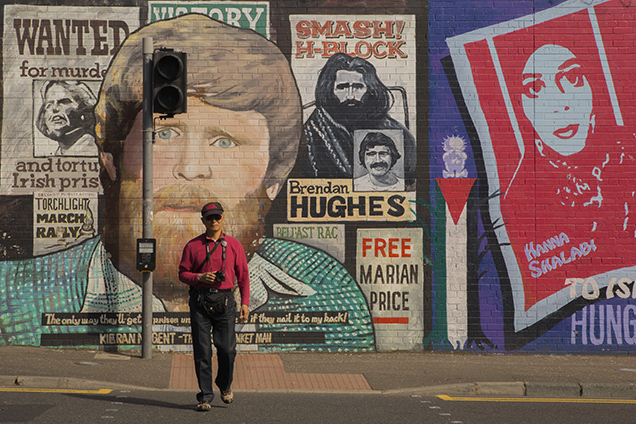2014 UniSA Nelson Mandela Lecture
 |
Making Partners of Enemies: the Irish peace process
Mary McAleese, former President of Ireland, in conversation with Annabel Crabb, political journalist and commentator
Wednesday 3 September 2014
Abstract
Nelson Mandela once remarked "If you want to make peace with your enemy, you have to work with your enemy. Then he becomes your partner".
The truth of that observation took a long time to dawn on the protagonists in the generations old politico/sectarian conflict that afflicted Ireland and her people and Ireland and her coloniser. Indeed it seemed as if every attempt at creating "peace" was doomed to failure.
Despite some calling the problems intractable the peace-makers set about navigating towards a partnership between these deeply estranged old enemies, resulting in the international treaty known as the Good Friday Agreement of 1998. It is based on justice, equality and parity of esteem. It is not perfect or pretty or without its frailties and mistakes. It is rightly and honestly called a "peace process".
There is a long journey still ahead, but there is also an emerging message of hope and proof that enemies can become partners.
In this very special event on the 2014 Hawke Centre calendar, former Irish President Mary McAleese in conversation with political journalist and commentator Annabel Crabb, takes us on a journey from where Ireland once was, to where it is now, and to where it needs to set its compass to move forward into the future.
 |
|
Co-presented by The Bob Hawke Prime Ministerial Centre and the School of Law, UniSA
 Mary McAleese, former President of Ireland
Mary McAleese, former President of Ireland
Mary served as President of Ireland from 1997 until 2011, and was the first President to come from Northern Ireland. The theme of her presidency was Building Bridges and her work for peace and reconciliation culminated in the historic state visit to Ireland by H.M. Queen Elizabeth II in May 2011.
A barrister and journalist by training she was Reid Professor of Criminal Law, Criminology and Penology at Trinity College Dublin, and served as the first female pro-Vice Chancellor at the Queen's University of Belfast. She has strong commitment to social justice, and has served on various boards including as Co-Chair of the Working Party on Sectarianism.
She is the author of Reconciled being: Love in chaos (1997), Building Bridges (2011), Collegiality in the Code of Canon Law (2014). She is currently pursuing a doctorate in Canon Law at the Pontifical Gregorian University in Rome.
 Annabel Crabb, ABC Chief Online Political Writer
Annabel Crabb, ABC Chief Online Political Writer
Annabel Crabb is one of Australia's most popular political journalists and commentators. She writes about politics for ABC Online’s The Drum, and is a regular panellist and host for ABC News 24’s nightly programme of the same name.
Annabel is the creator and presenter of the hit ABC TV series Kitchen Cabinet, in which she stages polite home invasions and interviews politicians in their own kitchens. Annabel is an enthusiastic user of social media and currently has more than 120,000 followers on Twitter, with whom she converses about politics and exotic ingredients.
Annabel’s writing career includes: The Adelaide Advertiser, The Sydney Morning Herald, and was London correspondent for the Fairfax Sunday editions. She has published two books: “Losing It; The Inside Story of Labor In Opposition”, and “The Rise Of The Ruddbot”, in 2009 she was awarded a Walkley Award.
Full abstract
Nelson Mandela once remarked "If you want to make peace with your enemy, you have to work with your enemy. Then he becomes your partner". The truth of that observation took a long time to dawn on the protagonists in the generations old politico/sectarian conflict that afflicted Ireland and her people and Ireland and her coloniser.
It seemed as if every attempt at creating this thing called "peace" was doomed to failure. Some called the problems intractable but the peace-makers plodded on in the hope that it was possible to stop the toxic spores of a bitter history from constantly infecting the future. A new generation, among them those "intelligences brightened and unmanageable as crowbars" as Seamus Heaney called them, set about navigating towards a partnership between deeply estranged old enemies. That partnership is today set out in an international treaty known as the Good Friday Agreement of 1998. It is based on justice, equality and parity of esteem. It is not perfect or pretty or without its frailties and mistakes. It is rightly and honestly called a "peace process". There is a long journey still ahead before we see an end to the embedded culture of sectarianism, paramilitarism and separate identities fuelled by mistrust and fear. Yet these years of shared government in Northern Ireland, of a working political partnership between people of opposing views has for all its ups and downs, already delivered something considerably better than anything which preceded it. Above all it has delivered hope and proof that enemies can indeed become partners. Now we have to ensure they stay partners and that is the ongoing, relentless work of the peace process. In this lecture we journey from where Ireland once was, to where it is now, and to where it needs to set its compass to move forward into the future.

While the views presented by speakers within the Hawke Centre public program are their own and are not necessarily those of either the University of South Australia or The Hawke Centre, they are presented in the interest of open debate and discussion in the community and reflect our themes of: strengthening our democracy - valuing our diversity - and building our future.
The copying and reproduction of any transcripts within the Hawke Centre public program is strictly forbidden without prior arrangements.





